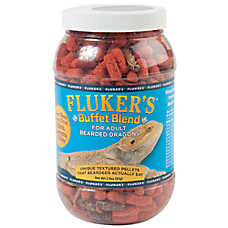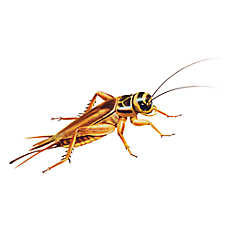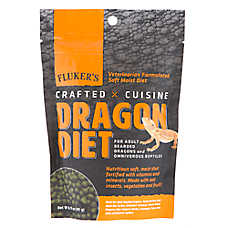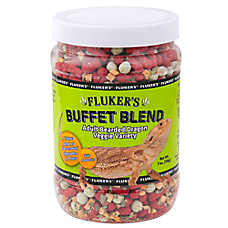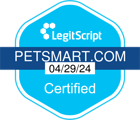What Do Bearded Dragons Eat? Complete Food and Diet Guide
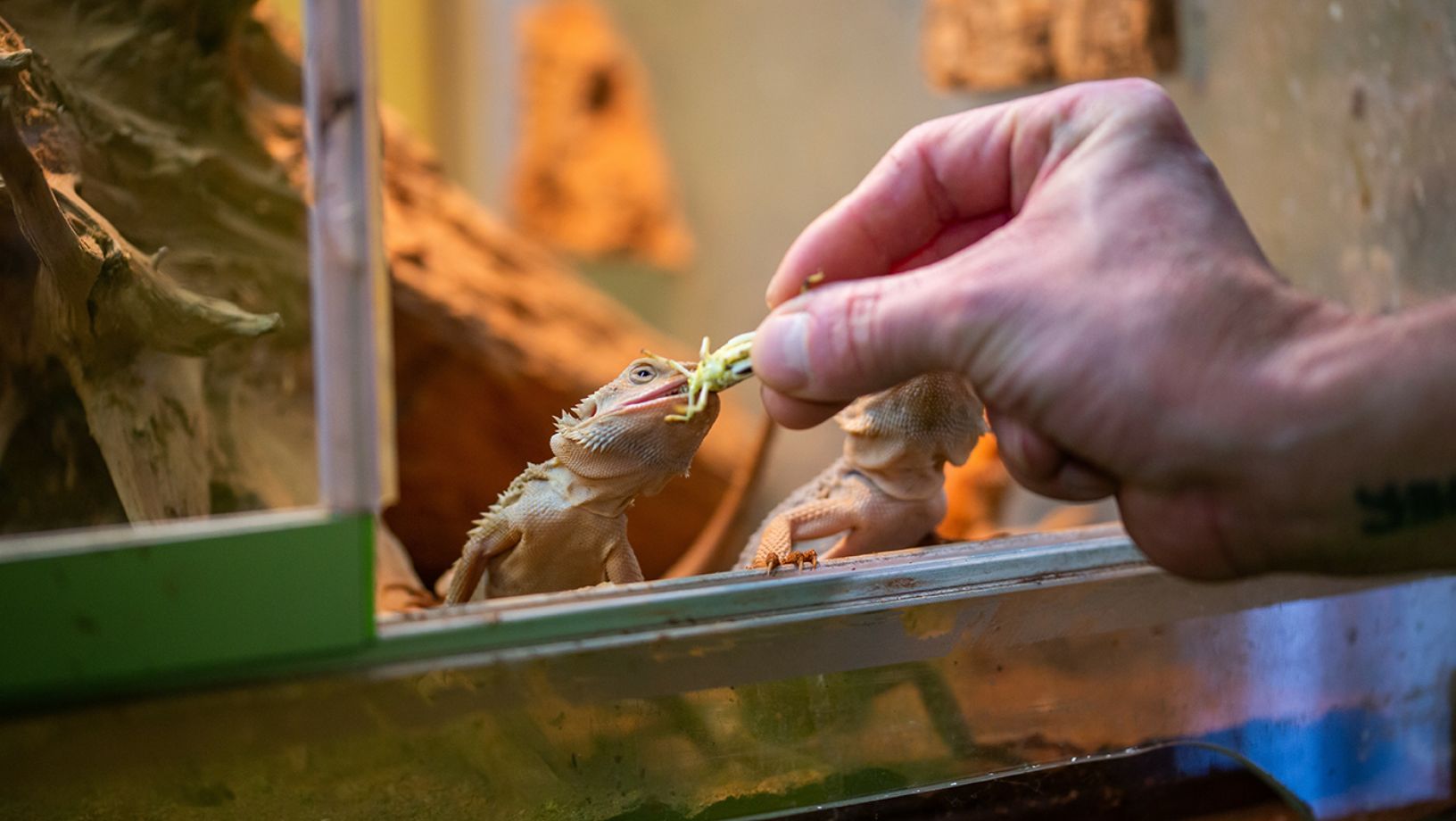
In this Article
Knowing what to feed your bearded dragon keeps them healthy, active, and thriving. These popular reptiles have specific nutritional needs that change as they grow from hatchlings to adults. Understanding what bearded dragons eat, how often to feed them, and which foods support their health helps you provide the best care for your scaly companion.
Why Diet Matters for Bearded Dragons
Proper nutrition affects every aspect of your bearded dragon's health. The right diet supports strong bones, healthy skin, proper digestion, and good energy levels. What you feed your bearded dragon impacts their quality of life, activity level, and overall appearance.
Bearded dragons need a balanced diet that includes protein from insects, nutrients from vegetables, and appropriate supplementation. Unlike dogs and cats, bearded dragons don't have commercial food readily available at every store, so you'll need to provide fresh foods and reptile food formulated specifically for their needs.
What Bearded Dragons Eat
Bearded dragons are omnivores with dietary needs that change with age. Young bearded dragons need more protein for growth, while adults eat primarily plant matter.
Insects
Insects provide essential protein for bearded dragons. Feed gut-loaded insects (crickets or dubia roaches) once daily. Gut-loading means feeding the insects nutritious foods before offering them to your bearded dragon, which passes those nutrients along to your pet. To learn more, check out this Reference into Feeder Bugs.
Young bearded dragons (under 12 months) need a diet that's about 50 percent insects and 50 percent plant matter. They need the added protein to grow and develop properly. Adult bearded dragons should receive a diet with more plants than insects. For adult bearded dragons, it is recommend their over-all diet consist of around 80% plant matter and 20% insects, with the exact ratio depending on your dragon's individual needs. Consult your veterinarian for specific guidance.
Mealworms, superworms, and waxworms should be offered only in small amounts as occasional treats due to their high fat content.
Vegetables and Salad Greens
Vegetables can make up 20 percent of a bearded dragon's diet. Offer fresh vegetables daily in a shallow dish. Salad greens should also be offered daily as part of a complete and balance diet. Good vegetable choices include:
- Butternut squash
- Zucchini
- Shredded carrots
- sweet potato
- broccoli
Good salad green options include:
- Collard greens
- Mustard greens
- Kale and arugula
- Turnip greens
- Dandelion greens
Chop greens and vegetables into bite-sized pieces appropriate for your bearded dragon's size. Remove any uneaten plant material after a few hours to prevent spoilage in their habitat.
Fruits
Fruits should be occasional treats, offered about once a week. While bearded dragons enjoy fruits, they're high in sugar and should be fed sparingly, making up about 5% or less of your dragon’s total diet. Good fruit options include berries (strawberries, blueberries), melons, mango, and banana in small amounts.
Prepared diets
Commercial bearded dragon pellets, moistened with water, may be offered daily in addition to fresh foods and live prey. Pellet diet is not recommended to be sole food source for a bearded dragon. These commercially available foods add variety to your beardie's diet and ensure they're getting complete nutrition. Many brands offer high-protein formulas for juvenile bearded dragons and lower-protein versions for adults.
Vitamins and supplements
Supplementation is essential for bearded dragon health. Gut loading insects prior to feeding your bearded dragon will help with their nutritional content, but you should not rely on gut-loading alone to provide all the vitamins and minerals your pet needs. Dust food with calcium and vitamin D3 powder regularly.
Your reptile vitamins and supplements should include:
- Calcium with vitamin D3: Four to five times weekly for juveniles, two to three times weekly for adults
- Multivitamin: Once weekly for juveniles, twice monthly for adults
Your veterinarian can provide specific guidance on supplementation based on your bearded dragon's age, health status, and diet.
Water
Provide fresh water daily in a shallow dish. Empty and refill the water bowl at least once daily. Some bearded dragons drink from their water dish, while others get most of their hydration from vegetables. You may also mist your bearded dragon's habitat lightly to increase humidity and encourage drinking.
How to Feed Your Bearded Dragon
The right feeding tools make mealtime easier and help you provide appropriate portions.
Feeding tongs
Reptile feeding tongs are small, tweezer-like tools that help you safely grab insects and feed them to your bearded dragon. Tongs let you control the feeding process and prevent accidental bites to your fingers.
Food bowls
Reptile food bowls work well for vegetables, pellets, and water. Choose shallow, heavy bowls that won't tip over easily. Ceramic or weighted bowls stay in place better than lightweight plastic options.
Insect feeders
Reptile feeders make it easy to offer live insects like crickets and mealworms. Some feeders prevent insects from escaping into the habitat while making them accessible to your bearded dragon.
Feeding Frequency by Age
Feeding schedules change as bearded dragons mature. Young bearded dragons have higher energy needs for growth and development.
Baby bearded dragons (0-6 months)
Feed insects two to three times daily, offering as many as they'll eat in 10 to 15 minutes. Provide fresh greens and vegetables daily, even if they don't eat much initially.
Juvenile bearded dragons (6-12 months)
Feed insects once or twice daily. Continue offering fresh vegetables daily as they transition to eating more plant matter.
Adult bearded dragons (12+ months)
Feed insects every other day, or 3-4 times weekly. Offer fresh greens and vegetables daily, as these should make up the majority of an adult's diet.
Storing Bearded Dragon Food
Proper food storage keeps your bearded dragon's meals fresh and safe.
Insects
Store live crickets in a cricket keeper with ventilation holes. For mealworms and other non-jumping insects, the container they come in or a plastic storage container works well. Keep insects in a cool area and provide them with fresh vegetables to gut-load them before feeding.
Vegetables and fruits
Store fresh produce in your refrigerator, just like you would for yourself. Wash vegetables before feeding and let them come to room temperature if they're very cold from the fridge.
Pellet food
Store commercial bearded dragon pellets in a sealed, airtight container in a cool, dry place. Check the expiration date and replace old food to ensure freshness.
Supplements
Keep vitamin and calcium supplements in their original containers, stored in a cool, dark place. Replace supplements according to package directions to maintain potency.
Foods to Avoid
Some foods are harmful to bearded dragons. Never feed:
- Avocado (toxic)
- Rhubarb (toxic)
- Fireflies or any glowing insects (extremely toxic)
- Wild-caught insects (may carry pesticides or parasites)
- Iceberg lettuce (no nutritional value)
- Spinach (in large amounts, binds calcium)
FAQs
Can bearded dragons eat lettuce?
Avoid iceberg lettuce as it has little nutritional value. Dark leafy greens like collard greens, mustard greens, and turnip greens are much better choices. Romaine lettuce can be offered occasionally but shouldn't be a staple.
How many insects should I feed my bearded dragon?
For baby and juvenile bearded dragons, offer as many appropriately-sized insects as they'll eat in 10 to 15 minutes. Adults should receive about 10 to 20 insects per feeding, offered a few times weekly. Insect size should be no larger than the space between your bearded dragon's eyes.
Do bearded dragons need live food?
Live insects are the best protein source for bearded dragons, as the movement triggers their natural hunting instinct. While freeze-dried or canned insects can supplement the diet, they shouldn't completely replace live feeders. The activity of catching prey provides mental stimulation along with nutrition. Keep in mind, gut-loading is not possible with already deceased insects.
Why won't my bearded dragon eat vegetables?
Young bearded dragons often ignore vegetables at first because they naturally prefer protein-rich insects. Continue offering fresh greens and vegetables daily. Try different types, cut them into various sizes, and be patient. As they mature, their appetite for vegetables typically increases. Some bearded dragons respond better to hand-feeding vegetables initially.
Can bearded dragons eat fruit every day?
No, fruits should be occasional treats offered about once a week. While bearded dragons enjoy fruit, it's high in sugar and can lead to digestive issues or unhealthy weight gain if fed too frequently. Vegetables and greens should form the plant-based portion of their daily diet instead.
Shop Bearded Dragon Food and Supplies
PetSmart carries everything you need to feed your bearded dragon properly. Shop reptile food, vitamins and supplements, food bowls, and feeding supplies for your bearded dragon. Find reptile supplies for every aspect of bearded dragon care.
Shop conveniently with Autoship for regular deliveries of food and supplies, Same-Day Delivery when you need something today, or Curbside Pickup and in-store pickup for your convenience.
Information in this article is not intended to diagnose, treat or cure your pet and is not a substitute for veterinary care provided by a licensed veterinarian. For any medical or health-related advice concerning the care and treatment of your pet, contact your veterinarian.
